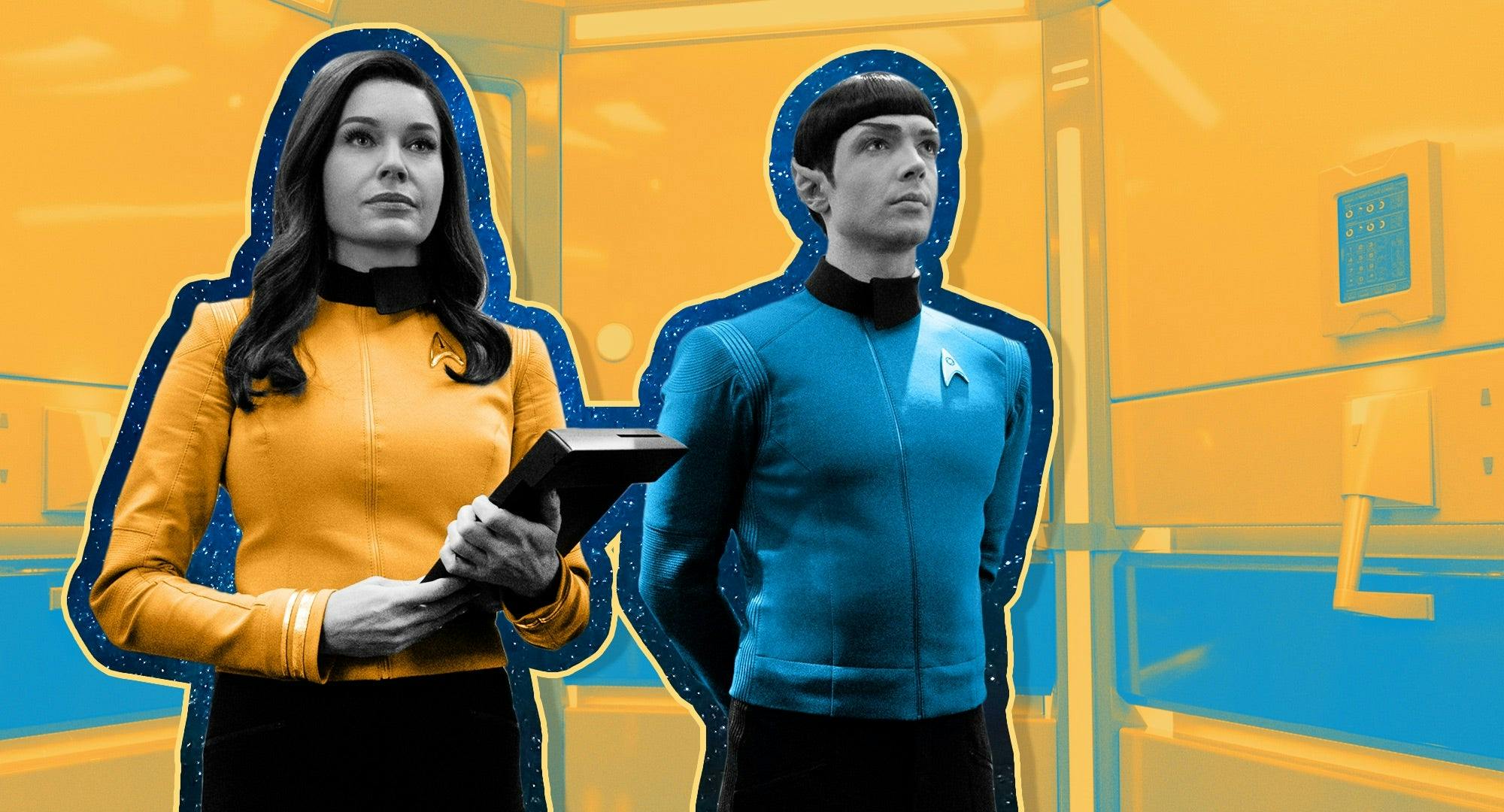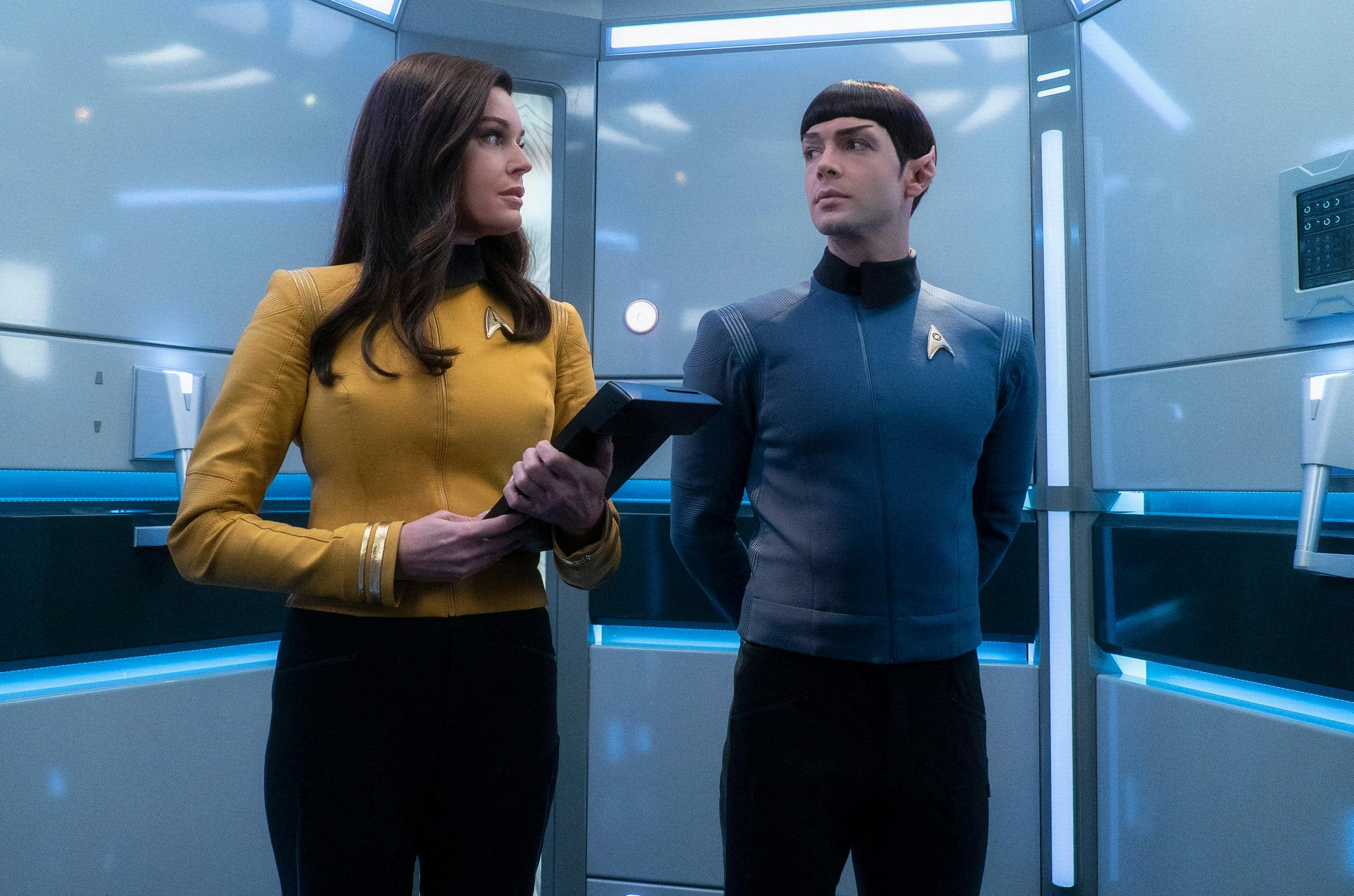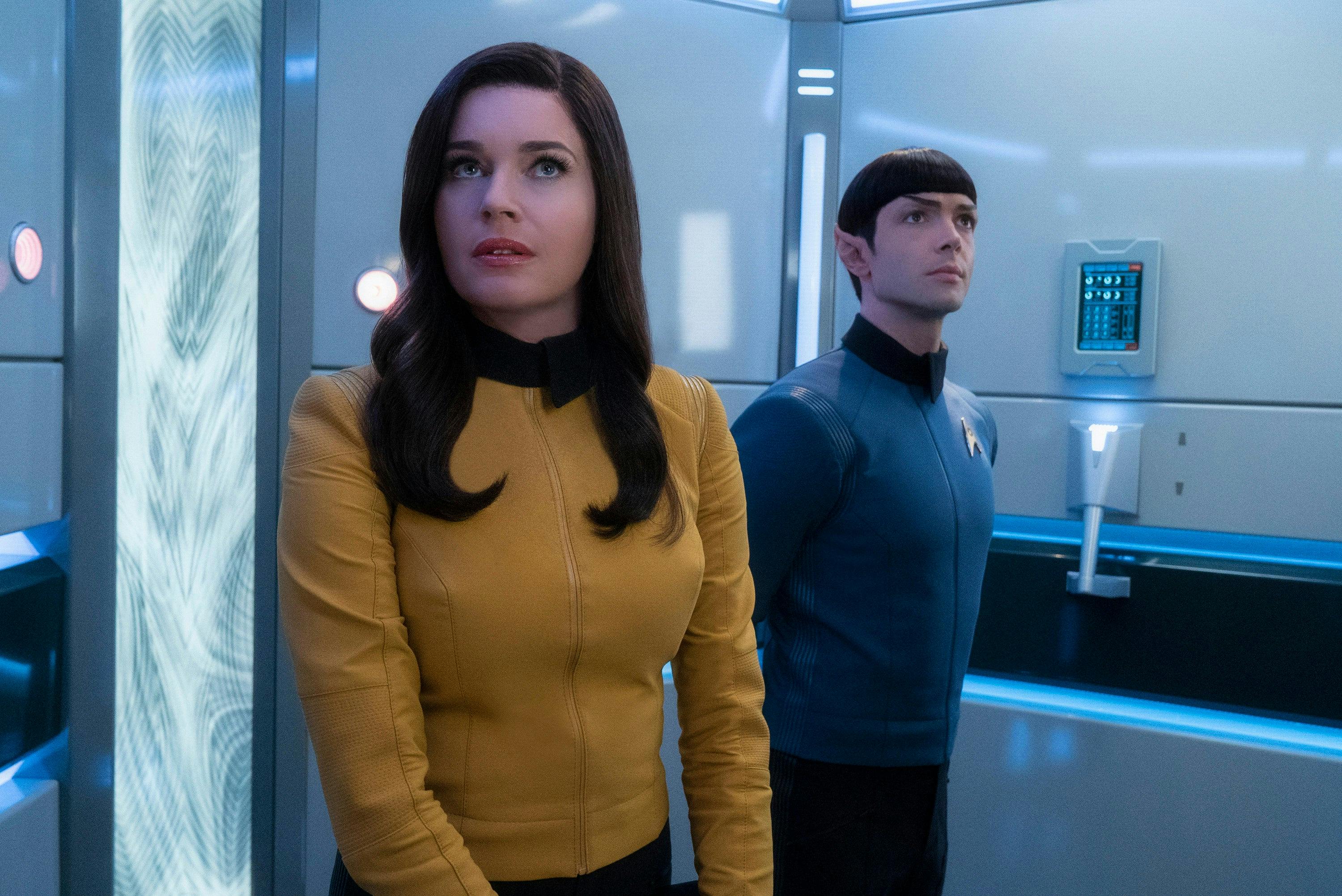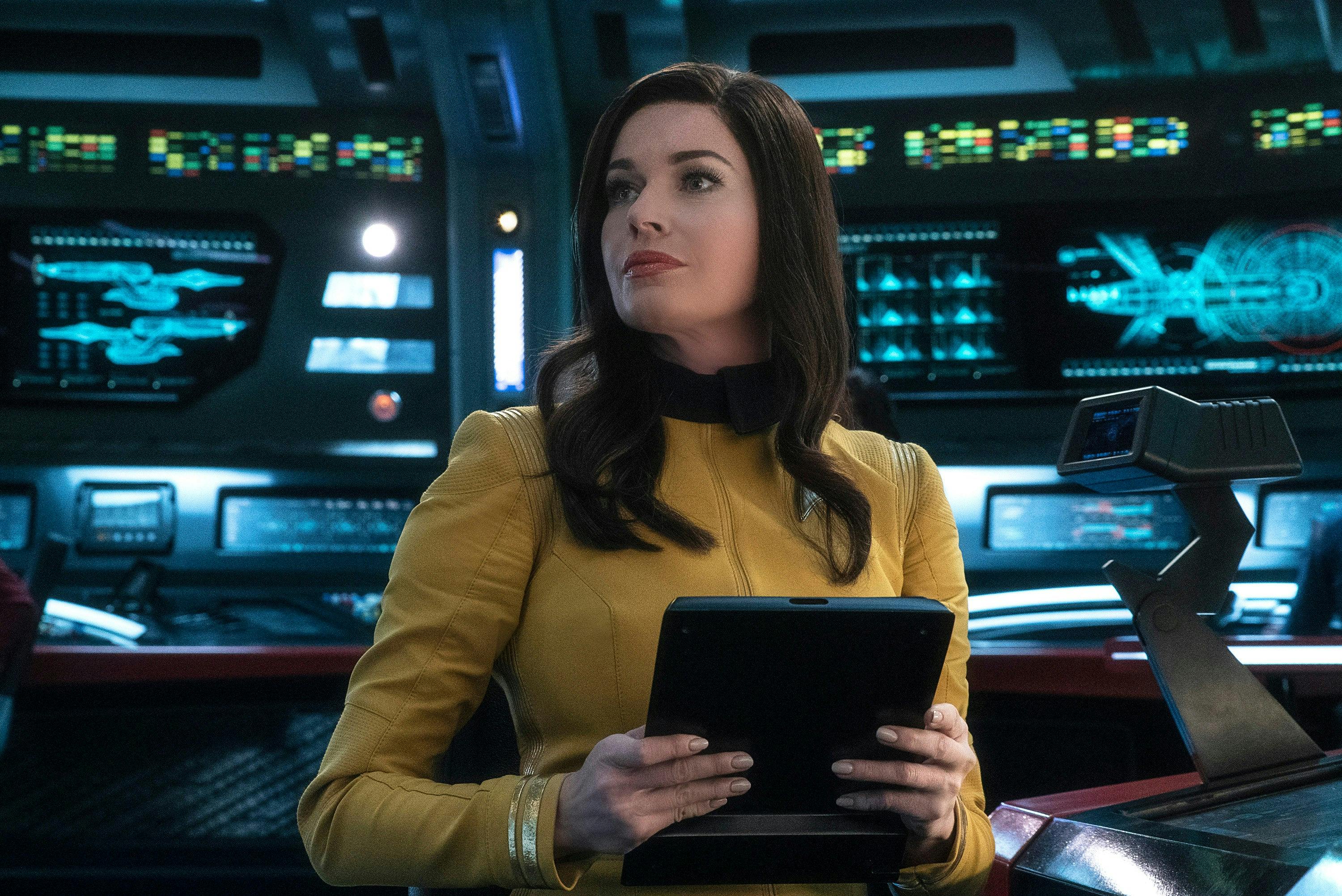
StarTrek.com
Two characters share an elevator. It’s uncomfortable, for whatever reason. Maybe elevators always are. They get stuck. They have to work together, or at least communicate.The situation becomes intimate and revealing for both.
It’s a classic trope — one that’s even been seen on multiple Star Trek shows already. But in the second-season Short Trek “Q&A,” the two characters in question are Rebecca Romijn’s icy, brilliant Number One (also known as Una) and Ethan Peck’s Spock, seen here as an earnest ensign who comes aboard the Enterprise for the first time. They carry the baggage of franchise history, particularly a real-life character switch that was never addressed in the Trek diegesis. They’re also Star Trek future, because they’re two out of three leads in the upcoming series Strange New Worlds.
Inside Star Trek: Short Treks 'Q&A'
To recap: Number One meets Spock as he beams aboard with a flash of a smile on his face. She tells him that his role as a Starfleet science officer is to bombard everyone he meets with questions until he becomes an “annoyance,” starting with her. They board the turbolift to the bridge and get stuck. In order to not waste the time until the problem is fixed, Number One tells Spock to continue asking questions. The questions reveal Una’s meticulous skill as an officer (she even designed her own glucose matrix for the Enterprise food replicators) and Spock’s capacity for curiosity and surprising insight. Surprising to her, at least.

StarTrek.com
In the end, she asks him a single question: whether he was smiling when he came on board. She tells him that if he intends to have a command position one day, he must learn to keep his “freaky” to himself, “even if that’s painful.” She then reveals her own freaky by singing the classic Gilbert and Sullivan patter song, “I am the Very Model of a Modern Major-General.” It applies to both of them. He joins in, and they share a laugh just before they are rescued. Then they reunite on the bridge, where they pretend that nothing happened.
It’s fourteen minutes of subtext, character development, and theme. It’s funny (Spock’s question about the Prime Directive being illogical and “perhaps morally indefensible” makes me cackle). There’s so much to unpack.
“Q&A” was directed by Mark Pellington and penned by first-season Star Trek: Picard showrunner and Pulitzer prize-winning author Michael Chabon, so the thematic deliciousness comes as no surprise. In his 2019 article for the New Yorker, “The Final Frontier”, Chabon discussed his process as he began to write this script while sitting at the deathbed of his father, who introduced him to Star Trek as a child. Chabon said that “Q&A” essentially functions like fanfiction in that it “patches a hole” in canon, namely the transformation of Spock from the smiling, emotional Vulcan in 1966’s unaired pilot “The Cage” to the stoic, logical being we know him to be.
We know the real-life story. Majel Barrett played Number One in “The Cage,” and both producers and test audiences were opposed to seeing a woman as second-in-command. When the show aired, she was eliminated. Spock got her job, as well as her stoic, logical personality. But in order to have both characters exist together again, we need a fictional explanation. Chabon’s solution is to make Spock and Number One fundamentally alike.

StarTrek.com
I have watched “Q&A” at least thirty times, so I’m a little biased. As a writer, I just marvel at it. Not a syllable of that script is wasted. But it speaks to me as a person, as well. This story avoids treating an alien culture as a monolith (i.e.: He’s logical because he’s half-Vulcan) by showing how a human woman could also make the choice to put intellect over emotion for the greater good, and because she wants to be respected. Spock’s choice to take her advice is his own, as well.
“Q&A” makes me think of one of my favorite books, Leslie Jamison’s The Empathy Exams, a collection of essays on the complicated ways we show compassion for others in a detached world. My favorite essay, “In Defense of Saccharin,” talks about our uncomfortable view of sentimentality — our own ability to be earnestly moved, or express simplified joy, and then be ashamed of it because we perceive it as frivolous or unearned. Jamison discusses the philosophical arguments against sentimentality, one of which is that it can stop you from doing what needs to be done. When you indulge your emotions, you might substitute feeling for action.
When Spock asks Number One to tell him the three most “salient” facts about Captain Pike, she says, lastly, that he is, “utterly unsentimental, except when it comes to horses.” Of course, the facts that she considers most important about Pike say as much about her as they do about him, including that she would agree with the arguments against sentimentality, especially when it comes to Starfleet command officers.
But there’s always that thing. Everyone has their horses. There’s nothing more sentimental than musical theater except, perhaps, a triple-mode, high-altitude Delta Scuti star. Spock’s mysterious, or not-so-mysterious, smile, which Peck carefully restrains in the final shot, hints at his sentimental awe at the grandness of the universe. The elevator encounter between Spock and Number One speaks to what it means to be human. For this reason, “Q&A,” which is dedicated to Dr. Robert Chabon, is both quintessential and essential Star Trek.
It’s easy to tell why Short Treks is the first Star Trek series to be nominated for an Emmy outside the technical categories since Star Trek: The Next Generation was nominated for Best Drama Series in 1994. They’re all great. Alex Kurtzman’s Star Trek universe on CBS All Access tackles the formidable challenge of marrying decades-old franchise nostalgia with the modern age of television, where both social and technological progress has changed the way we tell stories. It’s experimental. There’s a new level of artistry, new formats, and new approaches to classic ideas, including how to portray a woman in authority and a man wrestling with his humanity.

StarTrek.com
This would probably make Number One think that I’m unfit for a Starfleet command, but I got a little emotional when they announced Strange New Worlds. Ironically, Romijn’s Una was the reason. Don’t get me wrong, I adore Peck as Spock and Anson Mount as Captain Pike. They both brought such delightful grandeur to Star Trek: Discovery’s second season, and it would be silly to not see more of them. But as a lifelong Trek fan with a nerd-level interest in feminist critical theory, it’s hard not to be thrilled that the Enterprise’s original female first officer will finally get a chance to develop.
“Q&A” aired nearly a year ago, long before the announcement of the show. But I hope that it’s a glimpse into who both she and Spock will be when we see them again. To me, the exploration of these characters’ inner worlds is far more interesting than trips to alien ones.
Breana Harris (she/her) is a screenwriter, mental health worker, and Delta Quadrant fangirl from Los Angeles. She doesn't even go here, but she just has a lot of feelings. You can find her @breanaeharris on Twitter
Star Trek: Short Treks stream exclusively in the United States on Paramount+ and in Canada on Bell Media's CTV Sci-Fi Channel and streams on Crave.

